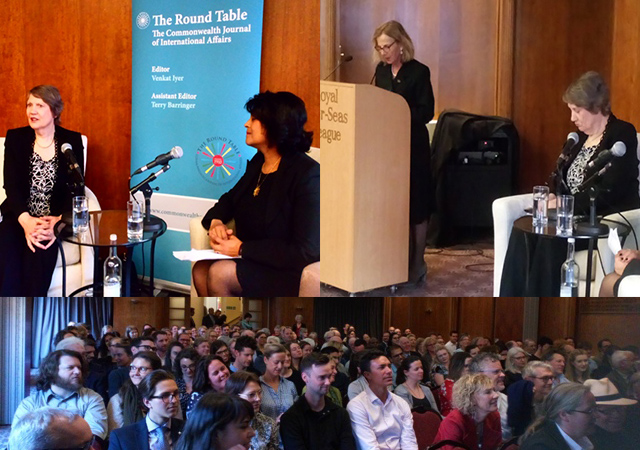
The Round Table’s 11 April event, featuring the Rt Hon Helen Clark “in conversation” with Keshini Navaratnam drew a large audience. New Zealanders clearly made up a large part of the audience as the former New Zealand Prime Minister answered questions from broadcaster and journalist Keshini, a member of the Round Table’s editorial board, and from members of the audience.
Given her career both in politics and as a former United Nations Development Programme (UNDP) Administrator, Ms Clark tackled questions not just on the Commonwealth, her successor Jacinda Ardern and small islands in global politics but also turned to Brexit, women in leadership, human rights, development issues and media regulations.
She praised today’s Commonwealth, stating that it was “reaching out much more than the traditional Commonwealth did”. She pointed to the role of the Commonwealth’s “constant advocacy” which had seen the wheel turn with the re-entry of the Gambia. On this note, she pointed out that the lack of inclusive politics in Zimbabwe was “not the entry ticket [back into] the Commonwealth”. On Brunei and changes to its penal code, Ms Clark spoke of stoning as “terrible” and “troubling” with respect to human rights. Pointing out that the Commonwealth “does need to keep re-inventing itself”, Ms Clark praised the “useful things” the organisation had done in its fund for technical development. She added that it needed to make its work on climate change more visible and “get articulate” on key issues. She said that “it needs an influx of younger leaders”, adding that the Commonwealth could take up issues including diversity, faith and communities living together, as it was “ideally placed to work on these networks”.
While praising the modern Commonwealth, Ms Clark said that, like all international institutions, the Commonwealth needed to prove its value. “You have to be relevant. If you’re not relevant, institutions die,” she told her audience.
The former New Zealand leader said that small states see the Commonwealth “as a voice for them”. Talking also about her UNDP days, she said that small countries and development finance had been an issue. Ms Clark pointed out that, while a country the size of New Zealand would be one of many in a grouping such as the UN, within the Commonwealth “as a small state, you value these platforms”.
Women leaders
On women as political leaders, Helen Clark praised Rwanda for having the highest proportion of women legislators. On her successor Jacinda Ardern, she said that the trouble with terrorism was that “we’re always fighting the last attack”. She said that the New Zealand mosque attacker had come to the country, joined a gun club and taken advantage of “our small, open society”. However, she pointed out that, if he had intended to divide New Zealand, it had had the completely opposite effect. “New Zealand can build on that,” she added. Ms Clark spoke about the amount of media regulation which had been developed for established media but said that social media had “created a space beyond the current regulators”. She suggested that there might need to be consideration of delays in live streaming to help curb attempts to live stream attacks. She admitted that the issue needed “all good minds”.
Britain’s EU voice
Asked about Brexit, Helen Clark said that Commonwealth countries could previously count on Britain “as a voice for us within the [European] Union”. She said that countries would now need to “beef up” other friendships but these would not have the depth of friendship Commonwealth countries had with Britain. “We will be missing a friend and rushing to develop relationships with other countries”, she added, stating that Britain’s voice would “be missing in a pretty important forum for us”. Helen Clark said that UK Prime Minister Theresa May had been “dealt a very hard deck of cards” as the crisis had seen the country “turn to a woman” after David Cameron’s departure. She said that negotiating with the EU was not easy and that, when it was one versus 27, the bargaining was hard.
Helen Clark continued on the theme of women leaders in the following Q&A session, giving a “shout out” to German Chancellor Angela Merkel for her strong stand on migration which had “cost her dearly” on German’s political scene. “She stood on a principle of not shutting the door to migration,” Ms Clark said, describing the German leader as a “leader with moral courage” who should be applauded.
Other questions from the audience dealt with the rise of populism, migration and refugee camps, China’s Belt and Road initiative and the role of elder statesmen (and women) in the Commonwealth.
Video highlights of this event are also available.



